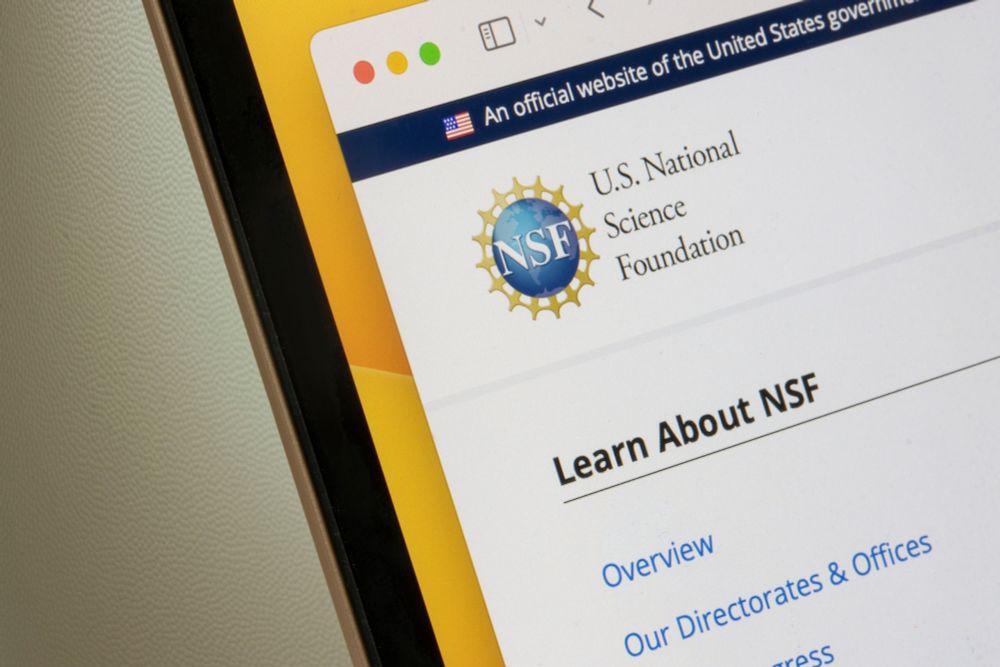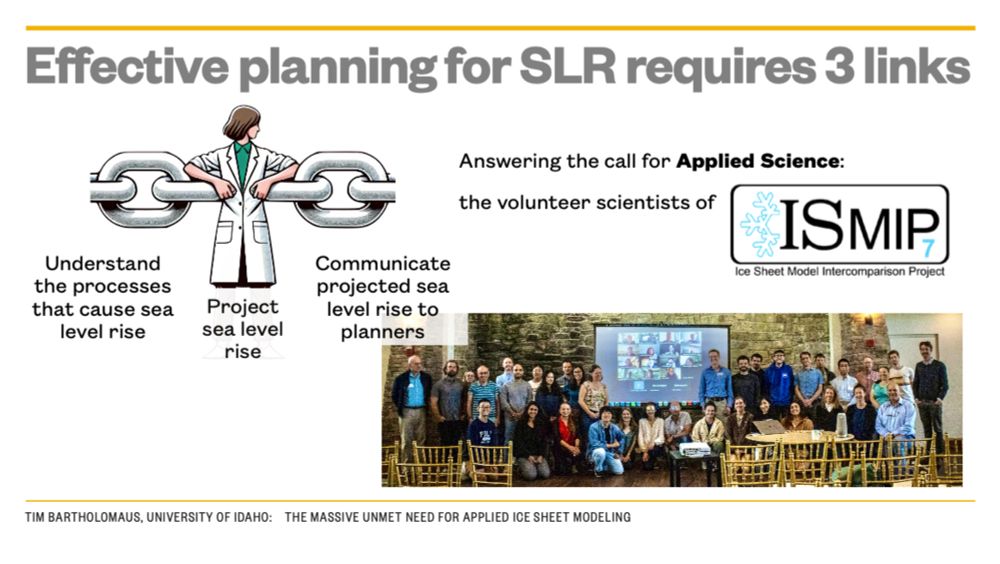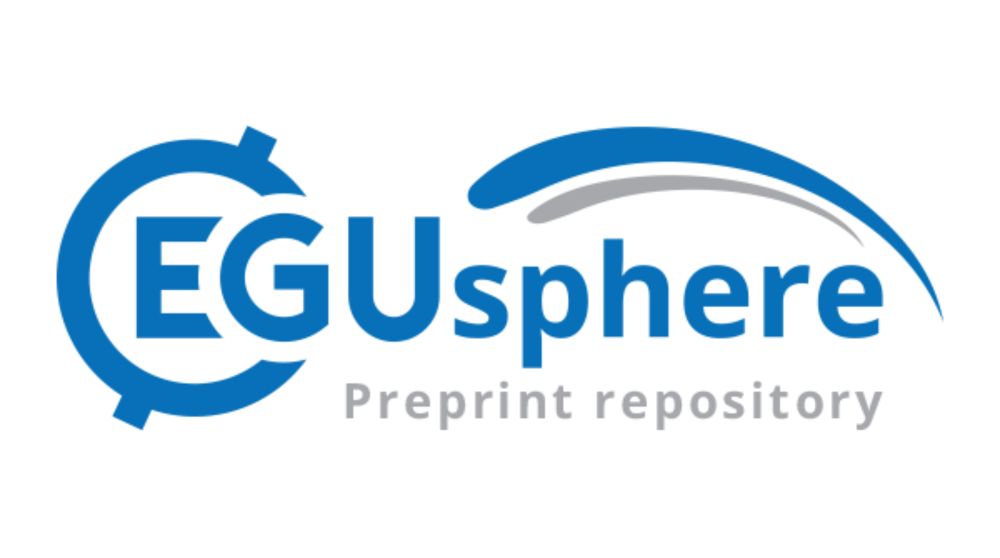

At this field area, downstream of McCarthy, Alaska, we can go and touch these overridden sediments and study them with as much detail as we wish. More commonly, these sediments are only accessible as a cm-scale core or via low resolution geophysical surveys.
01.12.2025 23:39 — 👍 6 🔁 0 💬 0 📌 0

Then, imagine my surprise when we learned that two complete glacial cycles were preserved in the sediment below! These predate the LGM and extend back probably close to 100 ka
01.12.2025 23:34 — 👍 7 🔁 0 💬 1 📌 0

I still find it mind boggling that in one of my favorite places, in Alaska, we can walk along on the bed of an ancient, water-terminating ice stream, just as we might find in Antarctica or Greenland. onlinelibrary.wiley.com/doi/10.1111/...
01.12.2025 23:34 — 👍 10 🔁 0 💬 1 📌 0
cool- thanks! I hadn't seen that one. So perhaps if the present ACC temperatures are a transient warming, which then passes, then they can all recover..?
(with the provision that the models all are simulating key physics sufficiently)
14.07.2025 19:13 — 👍 0 🔁 0 💬 1 📌 0
Glaciologists-
are you aware of any literature in the last couple decades that finds Thwaites to be in a stable setting? Or even that it might not collapse?
I'm not sure why we keep writing that "Thwaites Glacier _might_ collapse"
Can we just all cut to the chase?
14.07.2025 18:37 — 👍 0 🔁 0 💬 1 📌 0
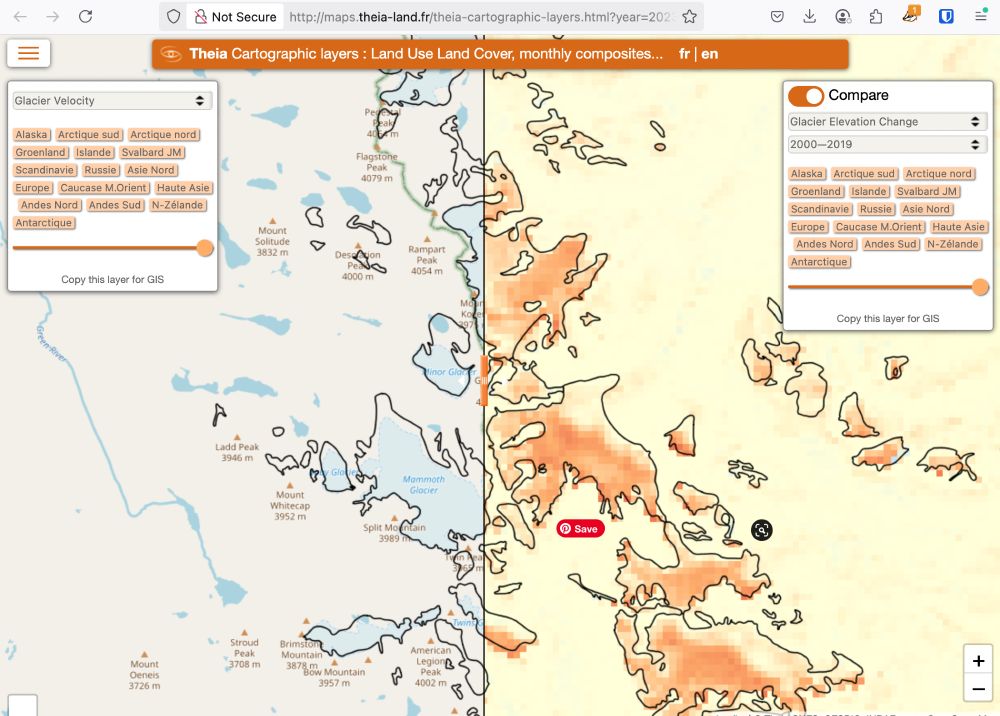
A local journalist reached out to ask about regional glacier change- one of the first places I checked was maps.theia-land.fr, a really super, interactive resource, hidden within Hugonnet et al., 2021, www.nature.com/articles/s41....
05.06.2025 17:40 — 👍 4 🔁 0 💬 0 📌 0
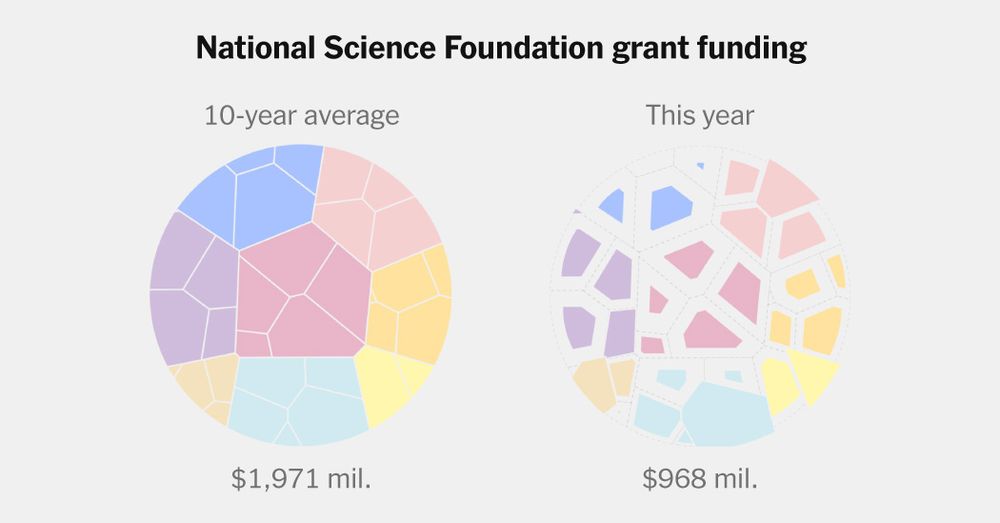
Trump Has Cut Science Funding to Its Lowest Level in Decades
The lag in funding extends far beyond D.E.I. initiatives, affecting almost every area of science: chemistry, computing, engineering, materials and more.
This is some bullshit
“The NSF polar office has awarded 88 percent less money in grants this year.”
This would take standard ~10% funding rates down to 1%.
No wonder my program officer was forbidden from telling me the funding rate after we were rejected www.nytimes.com/interactive/...
22.05.2025 17:38 — 👍 5 🔁 1 💬 0 📌 0
My wife hears Richard Alley giving kickoff plenary at an IPY meeting, and comes down the hall to ask "Who is _this_? This person is a delight!"
Talk about generational talent...
20.05.2025 15:42 — 👍 5 🔁 1 💬 0 📌 0
But I guess, if the main point is that "it's complicated," it's a small wonder that I hadn't yet encountered this essay. Where's the fist shaking?!
08.05.2025 17:50 — 👍 1 🔁 0 💬 0 📌 0
Here's the glacier intervention article that I wish everyone would lead with: eos.org/opinions/gla...
Neither in thrall to the wonders of Antarctica nor absolutist in opposition, the authors illuminate the middle way and finally get right the fact that there are many many complicated considerations
08.05.2025 17:46 — 👍 2 🔁 0 💬 1 📌 0
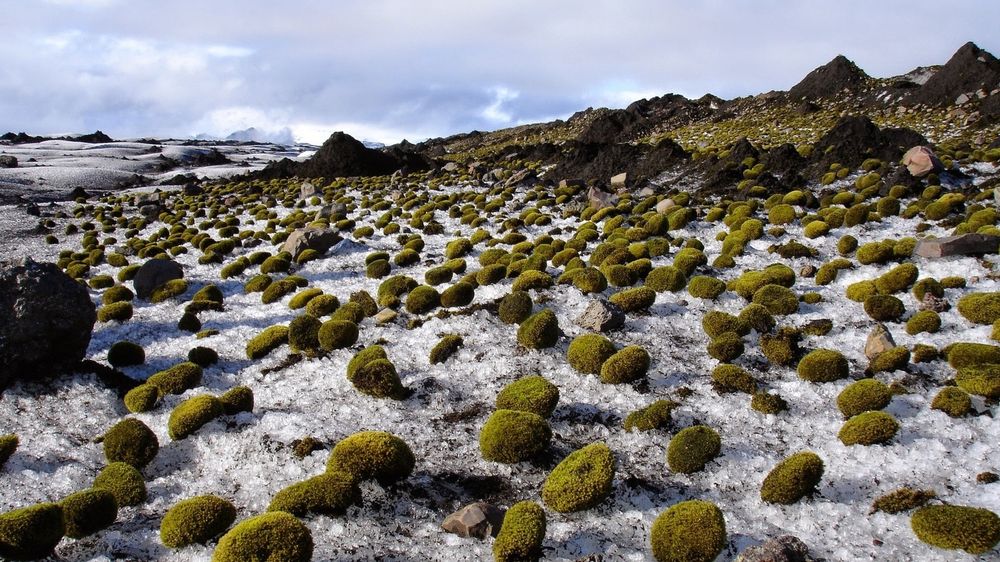
Meet The 'Glacier Mice' : Short Wave
(Encore episode.) In 2006, while hiking around the Root Glacier in Alaska, glaciologist Tim Bartholomaus encountered something strange and unexpected on the ice — dozens of fuzzy, green moss balls. It...
Although in retrospect, I realize part of the reason this was so popular is that it was a break from otherwise wall-to-wall covid coverage.
For more bewildering coverage of the highest impact work I’ll ever do, I tried to track it here: tbartholomaus.org/media/#:~:te....
29.04.2025 22:42 — 👍 1 🔁 1 💬 1 📌 0
Ahhh…. a simpler time…
29.04.2025 22:38 — 👍 3 🔁 0 💬 1 📌 0
Hearing all the trump news makes me think of a grad student who’s sending me a new draft manuscript every 4 hrs, with the note, “New version! Ignore the last one. Give me feedback on this one ASAP.”
29.04.2025 22:13 — 👍 3 🔁 0 💬 0 📌 0
 20.03.2025 00:47 — 👍 15 🔁 1 💬 1 📌 0
20.03.2025 00:47 — 👍 15 🔁 1 💬 1 📌 0
Have you gotten any reviews back recently? Anything out of the ordinary?
I remain committed to my work of understanding glacier behavior, in order to empower community responses to catastrophic flooding. But I'm not sure how to proceed in this mix of not enough and too much information
27.02.2025 00:36 — 👍 1 🔁 0 💬 0 📌 0

Broader Impacts
Any other recent experiences NSF experiences out there I can compare with?
There were glacier proposals, and according to 2024 best practice and current NSF guidance (www.nsf.gov/funding/lear...), we wrote "The team is dedicated to increasing diversity, equity, and inclusion in cryospheric science"
27.02.2025 00:36 — 👍 0 🔁 0 💬 1 📌 0
I've just had two resubmitted proposals rejected by NSF's Arctic Natural Sciences. One had only two reviews (E and VG) w/o a panel summary, and one had a short note from a program officer (stating that reviews were attached) but without any kind of peer review whatsoever. Unlucky? Or NSF in 2025?
27.02.2025 00:36 — 👍 3 🔁 0 💬 2 📌 0
Congratulations!
16.01.2025 01:34 — 👍 0 🔁 0 💬 0 📌 0
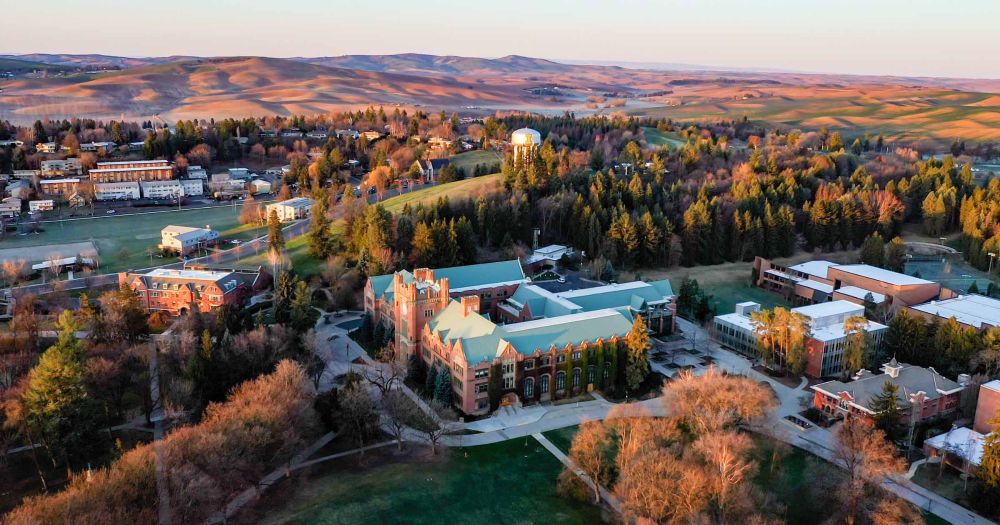
Regular Faculty
The Department of Civil and Environmental Engineering (CEE) at the University of Idaho seeks candidates for a full-time tenure track or tenured faculty position in Geological Engineering at the level ...
The @uidaho.bsky.social Dept of Civil and Enviro Engineering is hiring a Geological Engineer! Open until filled.
I highly recommend both the Univ of Idaho, and life in Moscow, ID. Excellent research and teaching support, stellar quality of life.
uidaho.peopleadmin.com/postings/46669
08.01.2025 22:20 — 👍 0 🔁 1 💬 0 📌 0
This is cool. I also can't help but watch and try to deconvolve EOFs in my head
07.01.2025 18:33 — 👍 1 🔁 0 💬 0 📌 0
Be in touch if you have questions or want to discuss more.
The first step to addressing this problem is identifying and communicating the problem.
02.01.2025 18:50 — 👍 0 🔁 0 💬 0 📌 0
This problem stems from the novelty of the research in this area and the legacy view of ice sheet modeling as an academic curiosity. Now that there is a clear applied need for ice sheet modeling to inform coastal planning, there needs to be a funding program to meet this need.
02.01.2025 18:50 — 👍 0 🔁 0 💬 1 📌 0
Because the simulations of observed ice sheet change are so flawed, the projections of sea level rise are likely flawed similarly. This means the funding going towards protecting coastal communities is potentially misallocated- it may not provide the level of protection for which its designed.
02.01.2025 18:50 — 👍 0 🔁 0 💬 1 📌 0
I created a starter pack on "Sea level change and coastal erosion". If you think I should add other people, please let me know. 7/x
@drstrawpants.wobbly.earth
@gaelforget.net
@gomezserrano-ma.bsky.social
@timbartholomaus.bsky.social
@bhamlington.bsky.social
go.bsky.app/B6spBdu
20.12.2024 19:32 — 👍 2 🔁 3 💬 0 📌 0
The national labs represent a fantastic model for how actionable, credible projections of sea level rise could be produced.
Our country decided that building a U.S. resilient to climate change is in the nation's best interest, and natl labs could meet the need.
Let's implement for sea level rise.
15.12.2024 19:01 — 👍 4 🔁 0 💬 2 📌 0
Where the future begins. 🚀🔬 One of the world’s leading universities for technology & natural sciences. Posts in both English and German.
www.ethz.ch
International Hydrology and Water Resources | Elevation models | Mapping | Landscape, Groundwater and Ecohydrological Systems Analyses
Passionate about mountains, cryosphere, natural hazards and technology to help with all that adaptation before us, professor
@uniinnsbruck, UIAGM mountain guide
Polar scientist studying ice dynamics using satellite data. I create and share animations of icy activity from satellite images
Parody. Merch: https://tinyurl.com/msjjmwpt
App State associate professor interested in glacier processes, glacier change, and downstream impacts
Glaciologist, Ice sheet modeler, Professor at @Dartmouth
We offer tuition-FREE, multi-day expeditions for high school girls* that interweave science, art, and backcountry travel.
linktr.ee/inspiringgirlsexpeditions
inspiringgirls.org
working on an investigative project on fossil fuel deception. board member of Society of Environmental Journalists. rebeccaleber.com
I run a newsletter/podcast called Volts about clean energy & politics. Subscribe & join the community at http://volts.wtf!
Physicist; ocean & climate scientist
Dog servant 🐕
📍Rimouski, Québec, Canada 🇨🇦
Website: https://denis-gilbert.ca
Google Scholar: https://scholar.google.ca/citations?user=6J1GChAAAAAJ&hl=en
Writing about intersection between climate adaptation and finance. Substack https://susanpcrawford.substack.com
Author of Charleston: Race, Water, and the Storms to Come. Learning all the time.
Sea-level and tidal scientist. Liverpool, UK.
Opinions own!
Cultural, environmental, and economic anthropologist. All things coastal. Photography. Some baseball too.
Civil and coastal engineering. Nonlinear waves, surge and urban flooding, tsunamis, post-disaster damage. Pet servant, guitar hack, sad Dodger fan.
Service-driven, applied climate and coastal hazards scientist. Keep things simple but no simpler. Trying to do that the best I can. Views my own.
Professor in Physical Oceanography working with tides in the Earth system. Faculty at School of Ocean Sciences, Bangor University. He/him/his.
McKenzie Fellow @ University of Melbourne. Interested in mud and past sea-level change. Pākehā living in Naarm. She/her
Professor of Environmental Change at the University of Leeds
Climate, sea level, Quaternary 🔬🌍
Leading the ERC RISeR project
UoL Geosolutions Research Centre
Free time 🚵🏃⛰️🛶🏕️🚴🚐🏋🏼♀️
She/her
Coastal Earth Observation Scientist from Canberra, Australia. Using satellite remote sensing 🛰️, open-source geospatial 🔓🗺️, Python + R 🧑💻 and dataviz 🎨 to map the earth through space + time... 🌏







 20.03.2025 00:47 — 👍 15 🔁 1 💬 1 📌 0
20.03.2025 00:47 — 👍 15 🔁 1 💬 1 📌 0
